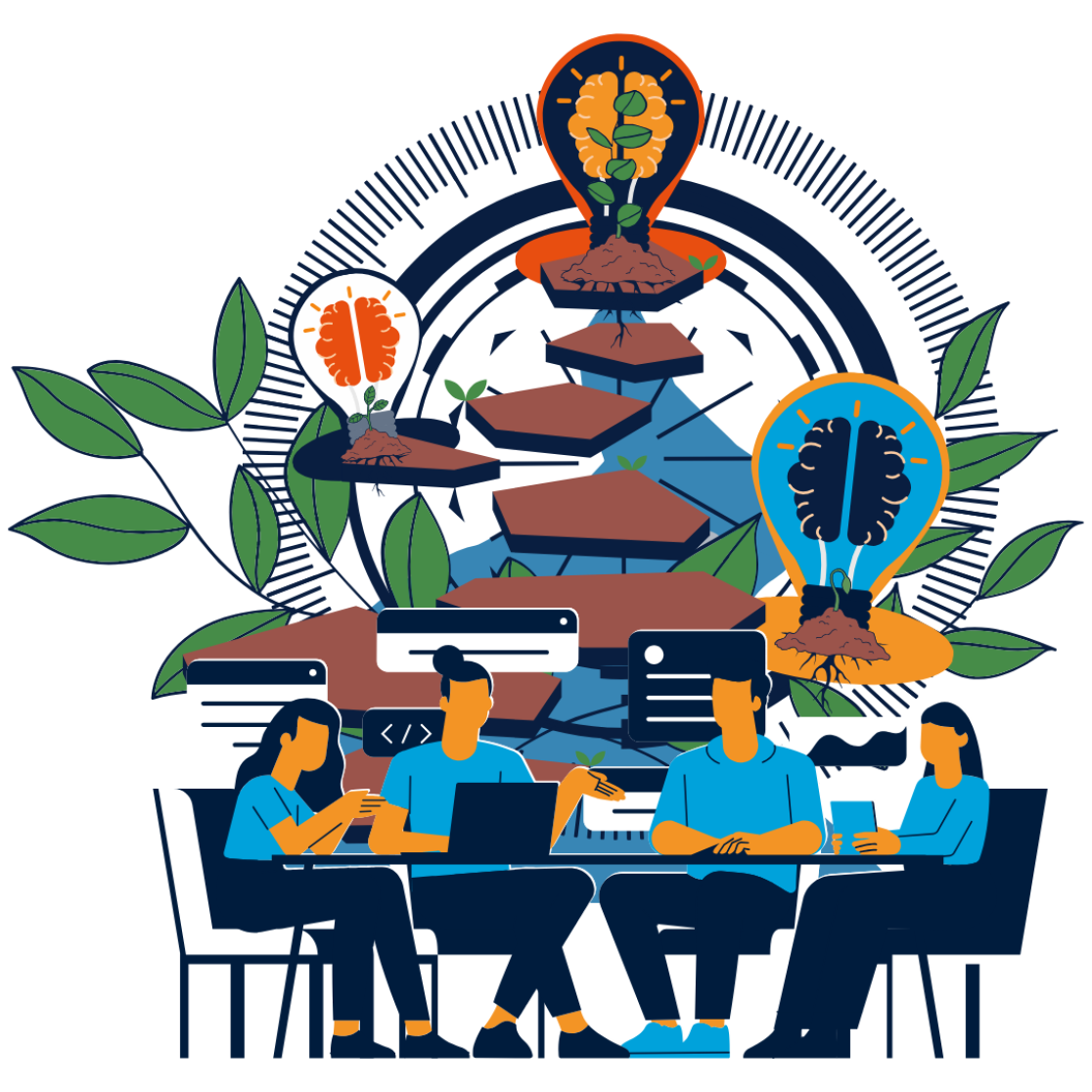EDLAB Education Research Fellowship programme
The EDLAB education research fellowship programme offers early career academic and non-academic Maastricht University staff members an opportunity to design, try out, and conduct research on an educational innovation in the UM classroom, with an appointment of up to 0,3 fte over a period of 12-18 months.
EDLAB education research fellows at the UM Education Days 2024
At the UM Education Days on 12-13 June 2024, the EDLAB education research fellows presented their projects in a 'gallery walk' workshop, facilitated by Alice Pan, EDLAB Coordinator for Education Research.
Join us again in the fall for updates on their projects!
Meet the 2023-25 research fellows and learn about their projects
Advancing problem based learning in STEM: The role of CCCS and technology
In our rapidly advancing technological world, tools like Large Language Models (such as ChatGPT) and Virtual Reality (VR) offer exciting possibilities yet present unique challenges. Currently, our understanding of how those technologies can enhance teaching and learning within Science, Technology, Engineering and Mathematics (STEM) disciplines, particularly in a Problem-Based Learning (PBL) environment, remains limited.
My research fellowship, in collaboration with EDLAB, is dedicated to exploring how these innovative tools impact both educators and students. Our initial focus is on the role of Large Language Models in PBL. Together with a team of student-assistants, we are writing a review that aims to establish practical guidelines for using LLM in PBL for educators and students. This includes feedback from students within the Liberal Arts and Sciences colleges, who have shared valuable insights through surveys on their opinions of using LLMs in a PBL setting. Students at the Maastricht Science Programme conducted these studies in their 4-week project period.
Looking ahead, our research will expand to investigate the potential of Virtual Reality to enhance student-learning experiences in STEM in collaboration with the Faculty of Health, Medicine, and Life Sciences (FHML). We will also design and evaluate a new module in the University Teaching Qualification programme at the Faculty of Science Engineering. This module will include the role of technology in educational design. The goal here is to inform educational design strategies to better serve our educators and students. Ultimately, this fellowship aims to broaden our understanding of these technologies for effective learning and to apply these insights to design and deliver high-quality education at UM.
Read our news article: Stefan Jongen explores integrating Large Language Models in education to support learning and teaching
Research project results, November 2024:
- Use cases from UM staff
Navigating the role of Large Language Models
in Problem-Based Learning: A rapid review
- Student guidelines for effective LLM use at UM
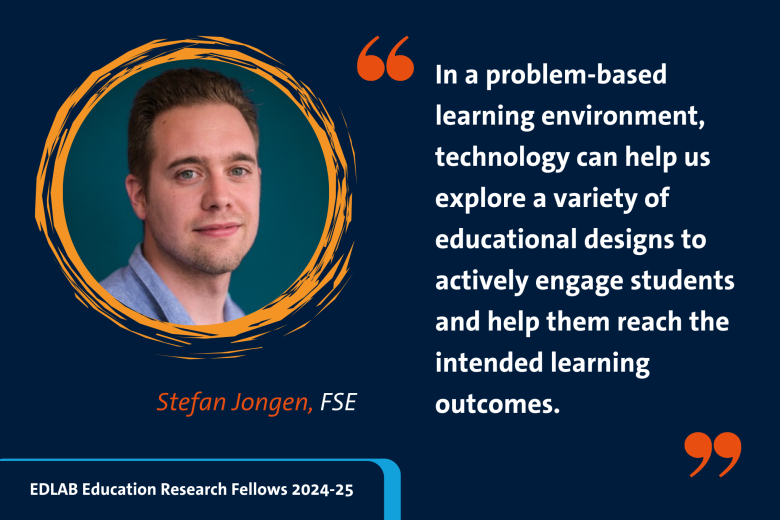
Using evaluation data to guide teachers' Continuing Professional Development
Educational programmes rely on the quality of their teachers, shaped by contextual and personal factors. Higher Education Institutes monitor, control and continuously improve educational quality. These processes may create tensions between an organisation’s need to monitor improvement efforts, and to simultaneously foster teacher’s Continuing Professional Development (CPD). If teachers are to fulfil their potential as evaluators of their own teaching performance and contribute to educational quality, we need more insight into how we can support our teachers’ Continuing Professional Development (CPD).
Using a case study approach, we will collect data across different UM faculties, by conducting focus groups with teachers on their use of evaluation data to reflect on their teaching. This project will raise awareness around learning and development opportunities that stem from evaluation data, thereby enabling organisational learning through sharing best practices across faculties.
We pose the research questions: How do UM teachers across faculties perceive and use evaluation data for their continuing professional development? How can teachers reflect on their teaching performance, and make an informed choice of CPD activities, aligned with their learning needs?
Read our interview: Carolin Sehlbach’s research examines feedback as a tool for growth in education
For more information about the project, contact Carolin.
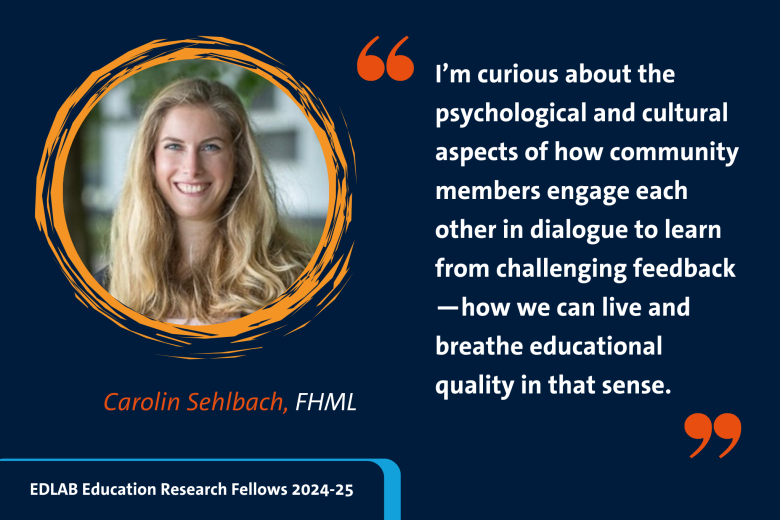
The development and initial implementation of a learning path focused on competence-based education in the Prevention and Health track in the Health Sciences
It's crucial for students to possess diverse competencies to excel in academia, practice, policy, and industry. But how do we ensure students are fully prepared for their future roles? At our university, while we focus on imparting subject expertise and research skills, it's equally vital to prepare students as collaborators, communicators, and professionals. Defining "professionalism" isn't easy—so how do we teach this to our students?
In my research project, I aim to delve into these competencies, particularly emphasising professional conduct. I'll explore effective methods to impart these skills, shifting from traditional teaching to experiential approaches. Moreover, the study emphasises self-management principles—helping students identify needs, set goals, seek coaching, and track progress.
During this study, I will also be excited to collaborate with various stakeholders, especially students and teachers, to brainstorm what the future student will need and how we can best support students in this regard. Do you have ideas or experiences to share in this area? Let's connect!
Contact Daniëlle for more information, and to share your input.
You can also read more about Daniëlle's research project in the article: "Building careers, not just degrees – Daniëlle Zijlstra’s research on competency-based learning"
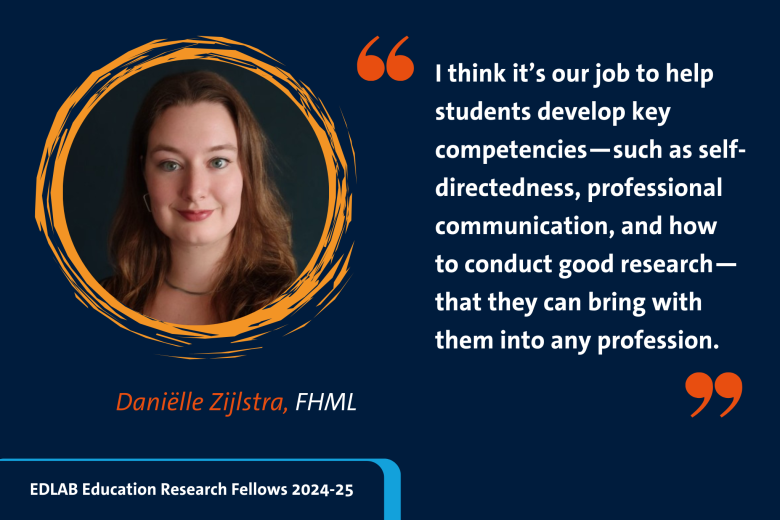
Understanding Maastricht University's academic culture
Ernest Boyer urged universities to not only explore the frontiers of knowledge, thus perform scientific research, but also ‘integrate ideas, connect thought to action, and inspire students’. Boyer proposed that education aims to prepare students for productive careers and simultaneously enables them to live their life purposefully.
Now, over 30 years later, universities, including their staff, are still struggling to balance their research and education efforts. Part of the struggle lies in the identity of academic staff. Do they see themselves as a scientist, a teacher, or a combination of these? And does this identity fit with what institutions expect from their staff, so fit with the institution’s culture?
It has been shown that teacher identity, relating to somebody’s sense of self as a teacher, is highly linked to intrinsic motivation. If one works in a culture that highly supports research efforts and in which teaching only becomes second, staff members may not feel the three basic psychological needs related to intrinsic motivation: competence, autonomy, and relatedness.
The current study aims to assess UM’s academics’ identity and academic culture to understand how academic identity and culture relate to job satisfaction.
For more information about the project, contact Anke.
You can also read more about Anke's research project in the article: "Teacher, researcher, or both? Anke Sambeth’s research aims to align academic roles with personal passion"
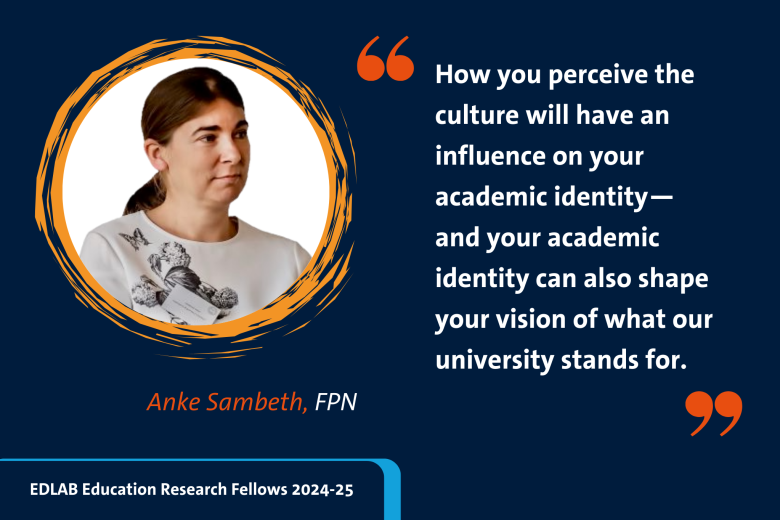
Enhancing co-creation for constructive educational design
To provide high-quality education that meets students' needs and maintain competitiveness, higher educational institutions must innovate. Collaborative educational design has been recognized as a promising strategy for necessary and ongoing renewal, as well as for teacher professional development. However, there has been little research on collaborative educational design in higher education.
In light of Maastricht University’s vision on assessment (2022), the Learning Academy at SBE developed a trajectory on collaborative education design and constructive alignment meant to support the teaching staff in the adaptation of their work according to the university’s new vision. The goal of the trajectory is to empower educators to reflect and adjust their curriculum (incl. assessment) for improved quality and effectiveness for students and teachers alike.
This project aims to (1) research the impact of the collaborative educational design activities on the professional development of the educators involved, and (2) study and evaluate the collaborative design process. It will do so by studying teacher teams’ perceptions of the trajectory, perceived impact on their educational design tasks, and collaboration within teacher teams.
Contact Marloes for more information about the project.
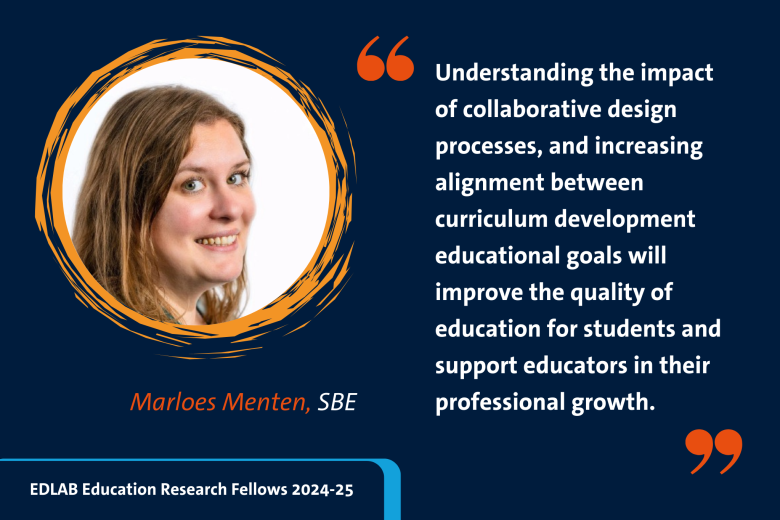
-
Robyn Ausmeier, FASoSMapping a way forward: Exploring the possibilities and limitations of AI as an educational tool
-
Stefan Jongen, FSEAdvancing problem based learning in STEM: The role of CCCS and technology
-
Carolin Sehlbach, FHMLUsing evaluation data to guide teachers' Continuing Professional Development
-
Daniëlle Zijlstra, FHMLThe development and initial implementation of a learning path focused on competence-based education in the Prevention and Health track in the Health Sciences
-
Anke Sambeth, FPNUnderstanding Maastricht University's academic culture
-
Marloes Menten, SBEEnhancing co-creation for constructive educational design
Programme overview
A common feature of teaching and learning centres (TLCs) nationwide is their evidence-informed approach to education innovation, teaching staff professionalization and support. As the Maastricht University Centre for Teaching & Learning, a core element of EDLAB's mission is to improve the educational knowledge infrastructures and inter-faculty exchange at UM. We strive to inspire and engage the UM community to innovate and evaluate their educational practice in the UM classroom, with a special focus on blended PBL-practices but also broader educational approaches.
EDLAB aims to be a central platform for Maastricht University education research communities and activities in the years to come. We facilitate sharing of expertise between faculties and build UM-wide communities of practice revolving around educational research with the aim to inspire, connect and professionalise innovative and applicable educational research at UM.
To achieve this, as a stepping stone for the above ambitions, EDLAB launched the Education Research Fellowship programme, with the first cohort of fellows running their projects in 2024-25. This programme offers an opportunity for educational researchers or researchers working on education to conduct research and/or evaluate the effect of self-piloted educational innovations in the UM classroom.

Goals
To allow academic staff members to engage in educational research, evaluation of education innovation and its effect on learning
To produce scientific evidence and add to a body of knowledge that supports future education innovation at UM
To connect and facilitate exchange of academic staff members with central and inter-faculty educational research initiatives and build the education research community within UM
To establish additional knowledge -and exchange infrastructures between EDLAB and faculties
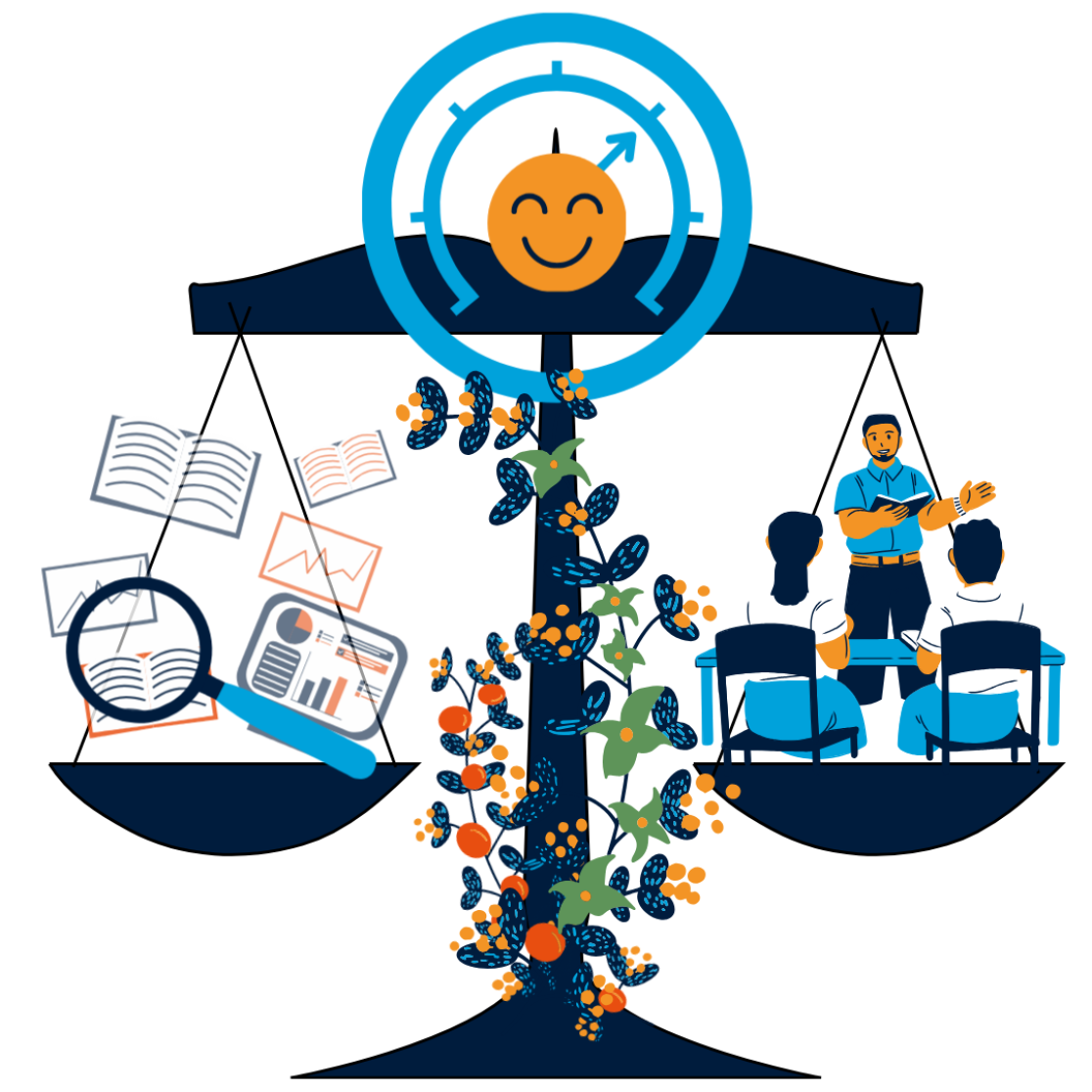
Details
- The fellowship combines educational research/evaluation and innovation
- Individual or interfaculty multidisciplinary teams
- 0.3 fte EDLAB secondment for at least 1 year, preferably 18 months
- In principle one fellowship per faculty
- The fellow plays a role in the dissemination and sustainability of the project’s findings
- The fellowship provides a stepping stone for academic staff with educational career ambitions.
- The fellowship programme hence strongly underpins the ‘reward & recognition’ initiative.
- The activities and findings within the fellowship can be part of explorative or preparatory work for Comenius proposals.
